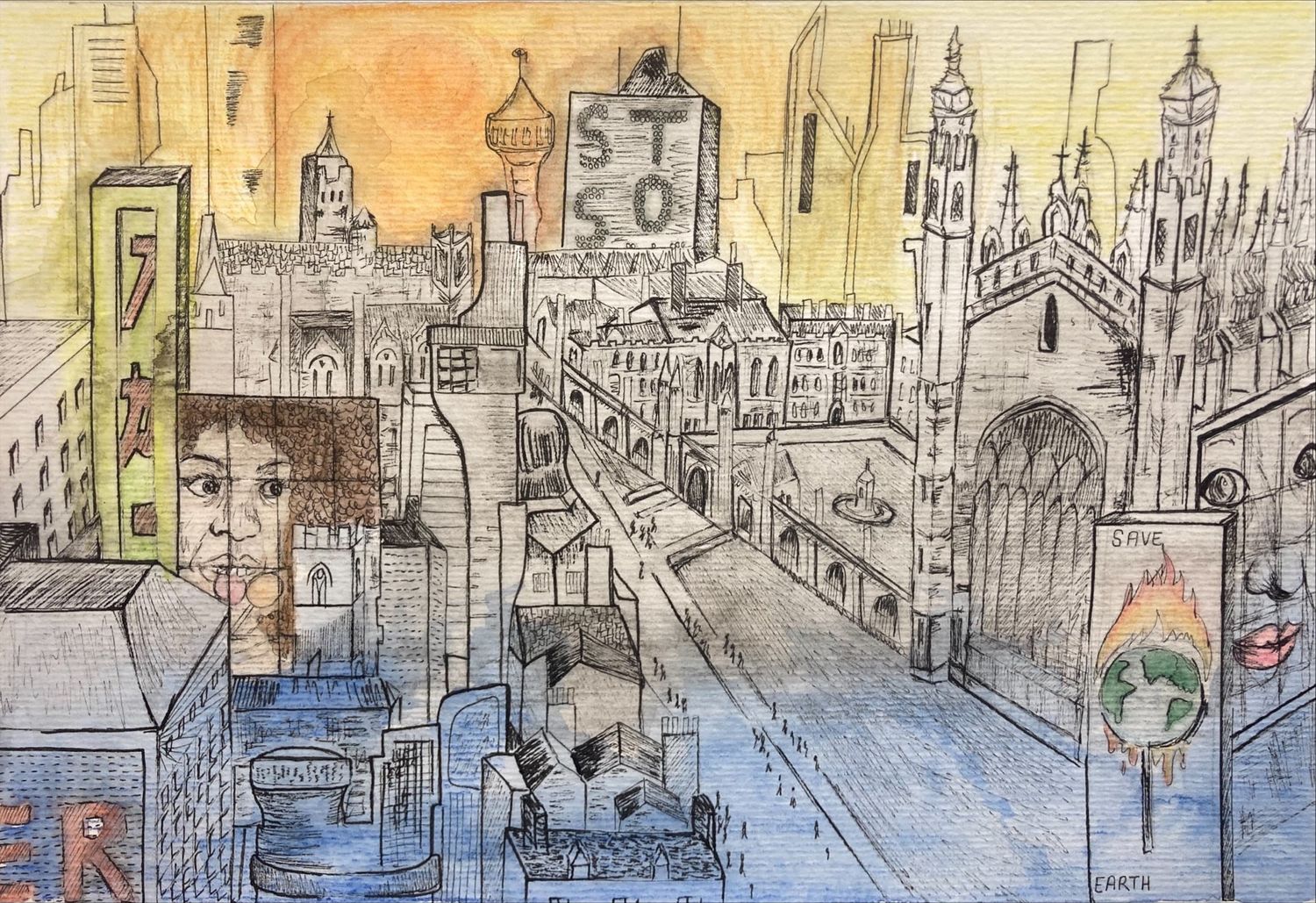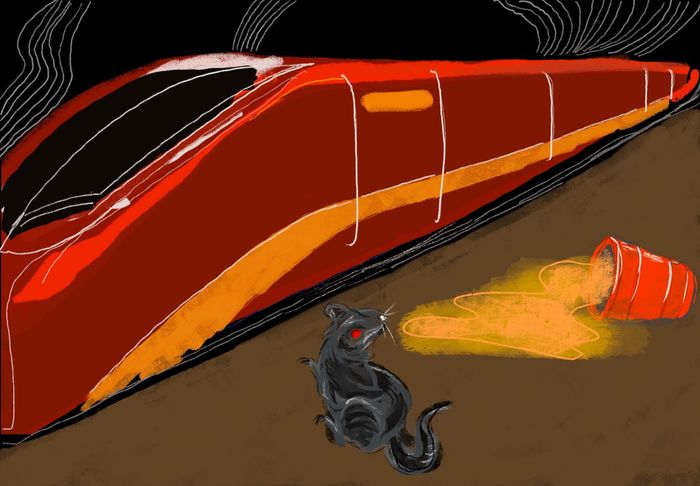The lift ascended smoothly and elegantly with ear-popping speed; within seconds he had reached the 73rd floor. The doors opened to reveal a featureless lobby painted dove grey, with one window, one door, and no signs except the bald notice on the wall opposite the entrance stating: “TO CHECK IN, SCAN YOUR WRIST IMPLANT HERE.” The room was bare, cool and functional, it had all the charm of an operating theatre. After checking in, he wandered over and looked idly out of the window, where tiny motes of dust were illuminated in the late morning shafts of light. He looked out over a panoramic view of endless olive and citrus groves stretching far into the distant Fens and on towards The Wash.
The journey from London had been uneventful, with the usual mixture of tourists, locals, and, of course, students. There was one particularly noisy group of overseas visitors, from Southeast Asia he thought, tightly-packed into the seats adjacent to him in the cramped Monopod. They chattered excitedly, taking seemingly endless Digi-Pics of everyone and everything. Despite the fact that it was February and that there was ostensibly air-conditioning, the pod was stifling. Air-conditioning was rapidly becoming a thing of the past – too energy-greedy, the authorities said. He could see an orange-brown haze hanging in the sky through the window as they shot at high speed past the faceless urban landscape.
“The skyline was totally dominated by these towering pinnacles looking like fat needles on a gargantuan pin cushion”
One good thing about this 50-mile journey, though, was that it was mercifully short in duration – they would reach the outer, outer London suburbs within a few minutes, and shortly after that, they would be starting to slow down prior to the smooth glide into their destination – the ancient university city on the edge of the Fens that was, these days, the centre of excellence for a world revolution in science, medicine, and technology.
The penultimate stop was at the outskirts of the city, close to where the old railway station had been. The story went that in the days of the coming of the railways, the powerful colleges had lobbied for the siting of a station to be well away from the medieval centre, and so it had been. He decided to get out and walk the final couple of miles to his appointment. He needed air and time to think about his application and the forthcoming interview; he was becoming more nervous by the minute. It was still warm outside but the east wind, that people in the city said came directly from the Urals, afforded a little freshness – despite the metallic tang in the air. Many years ago, this same wind would have given rise to Siberian conditions, especially in February, but not now. In the distance, he could see the multitude of slender high-rise buildings that were squeezed between the medieval colleges. The skyline was totally dominated by these towering pinnacles looking like fat needles on a gargantuan pin cushion.
*
Deep in thought, he suddenly jumped as the one door in this cheerless room slid open with a metallic scrape and a disembodied female voice commanded him to enter. Interviews in this august place were notoriously difficult and their quirkiness was legendary, so he entered the room with some trepidation. If the featureless décor, along with the multiple security checks he had been through since arriving at ‘S.S. Tower 2’, not to mention the officious porters he had encountered, were all designed to put you on edge, then they had surely succeeded.
He had been surprised at the invitation to interview, not that he doubted his own academic ability; it was more to do with the subject that his higher education assessment programme (HEAP) had come up with – apparently the first recommendation of this kind in many decades. He didn’t imagine that there were still courses available in his particular area of interest, let alone at one of the world’s leading universities. He had applied more in hope than expectation. Very few universities offered degrees in ‘non-essential’ subjects. It was all Bio Terra-Forming, Genetic Manipulation, or Gravitational Engineering these days. He had never had any interest in anything remotely to do with science, technology or medicine, which put him at a distinct disadvantage. He guessed that this was because of his background. He had grown up in an unusual and distinctly ‘bookish’ family in north London. The word ‘bookish’ itself was an anachronism as printed books only really existed in librarch vaults and were as rare as a temperate summer’s day in London. As a boy, he was surrounded by multiple volumes of the real thing and subject-wise they could not have been more eclectic – but had definitely veered towards the Arts, Philosophy, and the Humanities. This was the legacy of his five-times great uncle who had been a university don here, and a world-famous figure in his day. His family culture was definitely one of wide-reading, scholarship, and musings about the meaning of existence – rather than one producing generations of doctors, scientists, or engineers. That said, his ancestor was a mathematician, as well as a philosopher, and mathematics was revered in this age of technology and science.
“It was important, in his view, to keep the past alive”
A young woman in her early thirties, with a half-shaved head and wearing the standard university dress of a black two-piece suit, white shirt, college tie and academic gown, introduced herself as Dr Voight-Kampff and asked him to sit down at a desk and rest his chin on a machine with a laser-like pointer, which, when aligned, shone a light directly into his right pupil. She shuffled momentarily in her seat, “You’ll forgive the response verification appliance – it’s standard procedure at all interviews, I hope you’re ok with it? Right, let’s begin…”
*
Gliding back into London, later that day, the air thickening by the mile, he re-ran the interview over and over in his mind. Initially it had been far more straightforward than he imagined, but it became more difficult as things progressed. He strongly sensed that his interviewer felt a total lack of enthusiasm and commitment for his application. She seemed mystified that the system had thrown up this young man with his desire to take a redundant subject.
At one point she had asked him bluntly why he would want to bother studying such a ridiculously outmoded, and frankly useless, subject as History? He had stumbled his way through some kind of response, about how it was important, in his view, to keep the past alive and about how an understanding of the past can be a key to the present. Surely, he had said, we owe a debt to those who have gone before? The generations that have lived, loved, and suffered in order to deliver us into the present? Haven’t many key events in the past ultimately led to improvements in society? He continued. Where would our parliamentary democracy be, for example, without the contribution of, say, Oliver Cromwell who, in the mid-17th century, had revolutionised the relationship between Parliament and the Crown, albeit in the most revolutionary and ultimately tyrannical way possible. Hadn’t Cromwell attended the very college attached to this tower? Hadn’t he also served as MP for this city?
She seemed less than impressed with the Cromwell example and responded that the past was full of mistakes and regressions in progress, and we never learned anything from them anyway. She had continued that studying subjects like History or Philosophy would not get our climate under control, or produce more food and ultimately wealth for the developing nations of the planet. Or indeed keep the interminable, pesky world pandemics at bay.
Momentarily he felt a slight prickling at the back of his neck and he couldn’t work out whether it was nervousness or anger?
He kept his trump card until last, shamelessly dropping the name of his illustrious ancestor and pointing out the contribution to philosophy, language, and learning that he had made to the advancement of knowledge way back in the middle of the 20th century. The fact that he had been a mathematician too would only strengthen his case, he thought.
After the big reveal, she sat in silence, mulling over what he had said. For the first time, he noticed some tiny dark tufts of hair sprouting from a mole on her chin. Finally, after what seemed like an eternity, she broke the silence and asked in a genuinely puzzled voice:
“Who was Ludwig Wittgenstein?”


